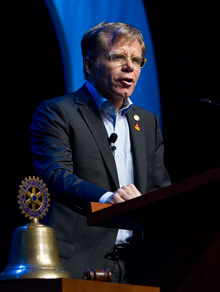What makes polio an emergency?

Bruce Aylward addess the 2012 RI Convention in Bangkok.
Why now?
Three things were driving the ministers of health of the world in declaring polio an emergency: first – on a positive note – polio eradication has reached a tipping point. India, the country that was responsible for almost half the world’s cases just two years ago, has now passed an entire year without reporting a case, providing incontrovertible evidence that polio can be eradicated anywhere.
However, and this is the ministers’ second point, polio cases unexpectedly – and alarmingly – surged late last year in the three remaining endemic countries, from where it would undoubtedly make a global comeback unless it is completely eradicated.
And third, the ministers saw further evidence that when polio spreads to polio-free places, it is increasingly deadly. In Tajikistan and Congo in 2010, and in China in 2011, polio paralyzed adults as well as children in these outbreaks with high fatality rates among the adults, reaching nearly 50 percent in some of these places. This is on top of other research that has recently shown that if we let this opportunity slip through our fingers, we will soon be seeing more than 200,000 children again being paralyzed by polio each year.
That’s not just a number, that’s children’s lives changed forever. Many of them would die. If there was a tsunami coming, with 200,000 children in its path, we would do everything we could to get the children out of harm’s way.
How can ordinary people help?
The first thing you can do is to sign the petition on the Global Poverty Project’s website to let world leaders know that you want them to make good on their promises to get polio finished. Presidents and prime ministers are, after all, answerable to their constituents. Follow End Polio Now on Twitter and Facebook to find out about other simple actions you can take. Then, if you want to get further involved, you can join your local Rotary club. RI is a fantastic organization – it was a couple of Rotarians that started the whole global movement to eradicate polio and they continue to campaign, raise money and volunteer in polio-infected countries today. You can also donate to Rotary’s PolioPlus Fund.
You can make a difference. It is everyone’s responsibility to see polio eradicated. Once we do, we will have achieved something extraordinary for all the world’s children, forever.
Read more of the interview on the Global Poverty Project‘s The End of Polio blog. Contribute now to help end polio.
Download the website sponsorship guide


